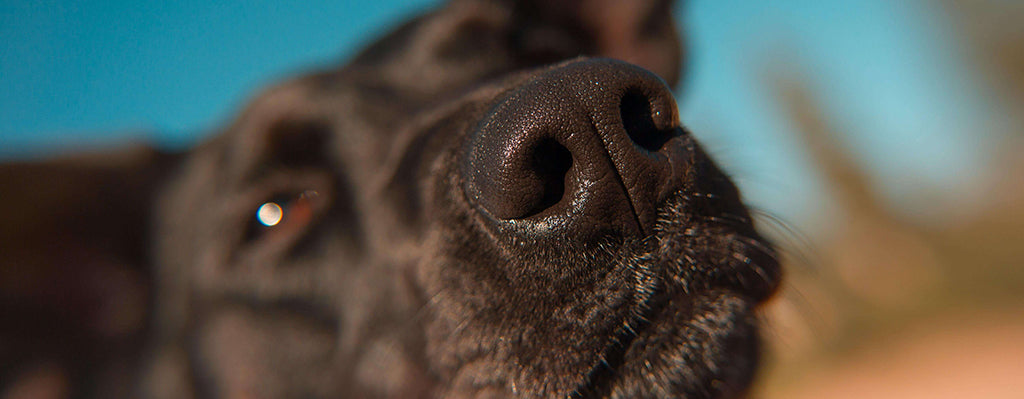Estimated Read Time: 4 ½ minutes
Summary: In this blog, we get in the know about nasal mites in dogs. We’ll discover what nasal mites in dogs are, what causes them, what the symptoms of nasal mites are, and learn about the treatment for nasal mites.
What Are Nasal Mites In Dogs?
Nasal mites are a type of microscopic mite that can live within the dog’s nasal passage and sinus cavities. The canine nasal mite (or Pneumonyssoides caninum or Pneumonyssus caninum) can affect all dog breeds, sexes and ages in any part of the world. This It’s a parasitic infection is that‘s more common in wild or stray dogs and is tricky to diagnose but easy to transmit.Your dog may contract nasal mites through nose-to-nose contact with another dog.
If your dog has a nasal mite infestation, they’ll usually set up home in the nasal passages, the edge of the nostrils and their nasal sinuses. Here, they’ll feed off the keratin layer of skin (epidermis) up there – delightful, right!?
What Are The Symptoms Of Nasal Mites In Dogs?
Understanding the symptoms of nasal mites will help you properly assess your dog.
Symptoms of nasal mites can vary, but generally include:
- Sneezing
- Reverse sneezing
- Nose bleeds
- Head shaking
- Facial itching/pawing at the face
- Nasal discharge
- Laboured or high-pitched, loud breathing
- Coughing
- Impaired sense of smell
- Tiny white/slightly tanned coloured specks may be observed in the nostril area
- Restlessness or collapsing
Reverse sneezing and sneezing happens to dogs for many reasons, so these symptoms shouldn’t be the most immediate cause for concern. If they’re accompanied by bleeding and discharge, that’s more of an indicator that something’s going on up their snout and needs investigating.
Can Nasal Mites Kill A Dog?
Heavy, untreated infestations can lead to alveolar emphysema, where the air sacs of the lung’s inner walls are damaged. This, in some cases, can prove dangerous or fatal for dogs. The quicker you see a vet and obtain treatment, the less likely your dog’s overall health will suffer.

How Do Dogs Get Nasal Mites?
Dogs can catch nasal mites from nose-to-nose contact with other dogs incredibly easily, as mites are very mobile. This is the most common way of catching nasal mites in dogs.
However, mites can also live on fleas, ticks and flies so dogs can also contract nasal mites in this way too.
Nasal mites in dogs cannot be transmitted to humans.
How to Treat Nasal Mites in Dogs Nasal Mites In Dogs Treatment
Effective treatment for nasal mites should be made a priority, as they can be highly irritating and uncomfortable for a dog. Treatment for nasal mites needs to be administered by a veterinarian if you want to be sure the infestation is properly gotten rid of.
Schedule an Appointment With Your Vet
If you suspect something’s going on up a dog’s nose, get your pet looked over by a qualified, professional veterinarian as soon as possible. The vet will most likely flush the nose through (nasal flushing) and examine your pooch’s nose with an endoscope. They may also request X-rays, blood and urine samples.
If nasal mites are discovered, your pup will most likely be prescribed anti-parasitic medication, which could be applied orally or topically.
Always follow your vet’s instructions religiously and keep away from other dogs and pets until your pup’s infection has cleared so as not to pass it on. In some cases, dogs may need a follow-up appointment to check the infection has dispersed.

At-Home Care
In addition to visiting your vet, you can also take steps at home to make your pup feel better as they recover from a nasal mite infection. Applying a pet anti-itch cream can help soothe sensitive, irritated skin on the nose and ears. It can also help target external irritants.
Nasal Mite Prevention
The best prevention of nasal mites is to try and keep your pup away from stray dogs and keep them up to date on their anti-parasitic prevention treatments. Regular flea and worm control is an absolutely vital part of being a responsible pet parent and protecting both your dog and others they encounter. Using a topical parasiticide or anthelminthic is a great way to prevent nasal mites, as well as other parasites, including worms, fleas, ear mites, and ticks.
Recovering From Nasal Mites
Luckily, with proper and quick treatment, recovery from nasal mites remains good for infected dogs. The anti-parasitic medications that most vets recommend have an 85% success rate and while nasal mites might be uncomfortable for your pouch, they likely won’t be life-threatening when treated properly. If you suspect that your dog has nasal mites, contact your vet right away so they can prescribe the appropriate course of action.
Conclusion
Knowing when your dog is sick or not feeling their best is an important part of dog ownership. Here, we explained what nasal mites in dogs are, some of the common symptoms, and how to treat nasal mites. At PetLab Co., we’re always here to answer any questions you have about finding the right product to give your furry friend the love and care they deserve!
Sources
Canine Nasal Mites By Ned F. Kuehn, et al. “Canine Nasal Mites – Dog Owners.” Veterinary Manual, MSD Veterinary Manual https://www.msdvetmanual.com/dog-owners/lung-and-airway-disorders-of-dogs/canine-nasal-mites
Drdrool. “How Do You Know If Your Dog Has Nasal Mites?” Dog Health and Wellness, 3 Oct. 2021 https://drwaggers.com/how-do-you-know-if-your-dog-has-nasal-mites/
“Pneumonyssoides.” Pneumonyssoides – an Overview | ScienceDirect Topics, https://www.sciencedirect.com/topics/agricultural-and-biological-sciences/pneumonyssoides





